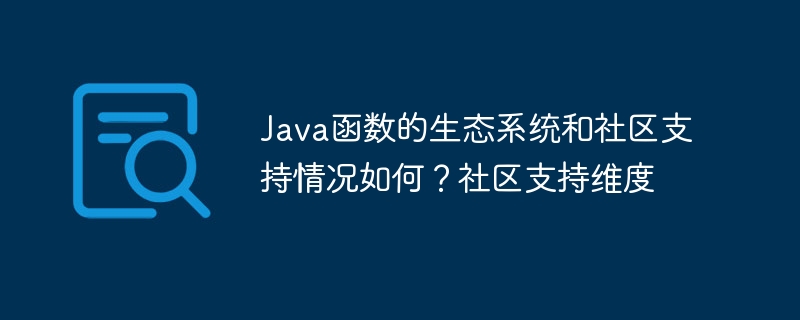Home >Java >javaTutorial >How is the ecosystem and community support for Java functions? community support dimension
How is the ecosystem and community support for Java functions? community support dimension
- WBOYWBOYWBOYWBOYWBOYWBOYWBOYWBOYWBOYWBOYWBOYWBOYWBOriginal
- 2024-04-28 15:18:02886browse
Java function community support includes: 1) forums and discussion groups; 2) documentation and tutorials; 3) community blogs and articles; 4) developer conferences; 5) online courses and training. These resources provide developers with assistance, opportunities to learn skills, and learn about new features to help build robust, scalable Java function solutions.

Java Functions Ecosystem and Community Support: Community Support Dimensions
Introduction
Java Functions It is a lightweight, event-driven programming model that has become increasingly popular due to its flexibility and strong community support. In this article, we will delve into various aspects of the Java Functions ecosystem and community support, focusing on the community support level.
Community support dimensions
The Java function community supports a wide range of dimensions, including:
- Forums and discussion groups:## Platforms such as #Stack Overflow, GitHub Issues, Java Community Forums, and more provide developers with a place to ask questions, get help, and participate in discussions.
- Documentation and tutorials: Oracle documentation, Spring Boot documentation, and third-party tutorials provide rich learning resources to help developers understand Java functions and build solutions.
- Community blogs and articles: Well-known developers and technical experts regularly publish blog posts and technical articles to share insights, best practices, and new features.
- Developer Conference: JavaOne, SpringOne Platform and other conferences provide an opportunity to network, learn and showcase the latest developments.
- Online courses and training: Platforms such as Udemy, Coursera and Pluralsight provide online courses and training to help developers master the skills of Java functions.
Practical case
Event-driven Web APISpring Cloud Function allows developers to quickly build event-driven Web API . For example, we could create a function to handle incoming HTTP requests and query the database using a JDBC template.
@Function("handle-request")
public String handleRequest(@CloudEvent CloudEvent cloudEvent,
@RequestPayload String requestBody) {
String sql = "SELECT * FROM users WHERE name = ?";
JdbcTemplate jdbcTemplate = new JdbcTemplate(dataSource());
List<User> users = jdbcTemplate.query(sql, (ps) -> ps.setString(1, requestBody), (rs, rowNum) ->
new User(rs.getLong("id"), rs.getString("name")));
return String.valueOf(users.size());
}
// 数据源配置
@Bean
public DataSource dataSource() {
try {
HikariDataSource dataSource = new HikariDataSource();
dataSource.setDriverClassName("com.mysql.cj.jdbc.Driver");
dataSource.setJdbcUrl("jdbc:mysql://localhost:3306/demo");
dataSource.setUsername("root");
dataSource.setPassword("password");
return dataSource;
} catch (Exception e) {
throw new RuntimeException(e);
}
// 事件类型配置
@SpringBootApplication
public class Application {
public static void main(String[] args) {
SpringApplication app = new SpringApplication(Application.class);
//CloudEventBuilder和ObjectMapper使Spring框架能够解析Message和Payload属性
app.addInitializers(new CloudEventCloudFunctionInitializer());
app.run(args);
}
}
Serverless Task ProcessingThe Azure Functions Java SDK allows developers to easily create serverless tasks. We can create a function to handle the change event of an Azure Storage Blob.
@FunctionName("handle-blob-event")
public void processBlobEvent(@BlobInfo AzureBlobInfo blobInfo,
@StorageAccountInfo StorageAccountInfo storageAccountInfo,
final ExecutionContext context) {
logger.info("Blob " + blobInfo.fileName() + " of size " + blobInfo.length() + "bytes uploaded to container "
+ blobInfo.containerName());
}
ConclusionThe Java Function ecosystem and its community are widespread, providing developers with various support channels and resources. From forums to documentation to developer conferences, community members can easily get help, learn skills, and learn about new features. These resources are critical for building and maintaining robust, highly scalable Java function solutions.
The above is the detailed content of How is the ecosystem and community support for Java functions? community support dimension. For more information, please follow other related articles on the PHP Chinese website!

